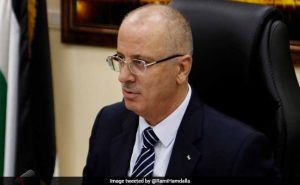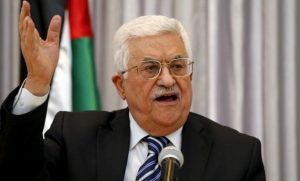Palestinian succession war heats up after Abbas’ controversial speech

Palestinian Prime Minister Rami Hamdallah
Shlomi Eldar, in Al Monitor, writes, “Palestinian President Mahmoud Abbas’ speech to the Palestinian National Council April 30 drew harsh criticism from Israel, Europe and the United States. He was criticized and accused of making anti-Semitic statements at home as well. But even before Abbas delivered his embarrassing and scandalous speech, some in the Fatah movement had started to speak about the need to replace him. After the speech, what had been limited to private conversations suddenly became public in the Palestinian Authority (PA) and throughout the world. It was not his anti-Semitic remarks that tipped the scale and led many Fatah activists to the conclusion that it was his time to go, but rather the state of the PA and his inadequate functioning, which can no longer be concealed. The international condemnations, including a blistering editorial in The New York Times that declared it was time for him to vacate his seat, reinforced the sense that Abbas is no longer functioning and that in addition to the issues brought about by his advanced age and deteriorating health, he doesn’t truly perceive the reality of the PA under his leadership.”
“The problem is that during the long years of his rule, since he succeeded PLO leader Yasser Arafat in November 2004, Abbas made sure to sideline any prominent Palestinian figure in his movement out of fear for his exclusive leadership. He expelled Mohammed Dahlan from the movement, exiled him from the West Bank and pursued his loyalists, who went underground. A few of them preferred to move to the Gaza Strip and live under Hamas rule, such as Sufian Abu Zaida, a former minister of prisoner affairs, so as not to live in constant fear that Abbas’ people would come knocking. Abbas also made sure to limit the power of Jibril Rajoub, who had claim to the throne. He demoted him from national security adviser to chairman of a sports association, so that he would not deal with the really big issues. Even Yasser Abed Rabbo, not a Fatah man but a loyal associate who was considered Abbas’ close adviser until three years ago, was humiliatingly dismissed from his role as the secretary general of the PLO Executive Committee.” (more…)
Daoud Kuttab, in Al Monitor, writes, “The April 30 address by Palestinian President Mahmoud Abbas at the Palestinian National Council’s (PNC) opening session caught many off guard. In his two-hour discourse, Abbas was keen to reiterate what he already said in previous speeches, defend his policies and justify his actions.The 83-year-old Palestinian leader seemed relaxed and happy to have succeeded in accomplishing what many thought was almost impossible.”

Mahmoud Abbas
“Abbas’ address followed the counting of present members to ensure that there is a quorum of two-thirds in the PNC session, which was broadcast live on Palestine TV. In fact, 605 out of the 741 members attended the meeting. The Palestinian leader felt vindicated to say that it is a “unique” event that 83% of the PNC members are present. He said that had the case been different or had the quorum been absent, the legitimacy of the PLO would have been questioned. The long, rambling speech, laced with colloquial phrases and attempts to contradict historical narratives, might be old-school Palestinian. This, however, has become Abbas’ signature in his speeches, which is perhaps an indication that he is thinking of his own legacy.”…
“While Abbas’ earlier remarks were upsetting for US and Israeli officials, the historical perspectives mentioned by the Palestinian president in his April 30 speech produced even more angry reactions. Abbas, whose studies in Moscow focused on the situation of Jews in Europe, delved into the Israeli and Jewish narratives and argued that these narratives eventually affected Palestinian aspirations for freedom on their land. In a blistering diatribe, Abbas reached back into history in an attempt to convince his audience that the search for a Jewish homeland was not necessarily part of the “longing for Zion,” but rather was encouraged by colonial powers in Europe.”
“Mahdi Abdul Hadi, chairman of the Palestinian Academic Society for the Study of International Affairs in Jerusalem, defended Abbas and said that he resorted to Jewish thinkers to back his statement. Speaking to Radio Monte Carlo May 3, Abdul Hadi said Israel is trying to escape its own policies and crimes in the Gaza Strip, the West Bank and even in the diaspora. He perceived the Western attacks on Abbas to be part of a double standard, saying, “Abbas used Jewish sources in reading the historical narrative. The sources are neither Arab nor Palestinian; he used Jewish sources regarding the state of Jews in Europe. Why has the world not paid attention to what Israel does and focused on Abbas’ words?” (more…)
